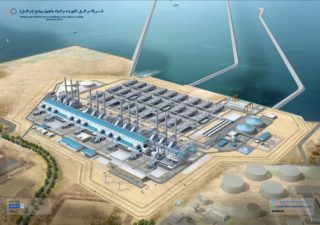 Kuwaiti desalination plants similar to this one provide all the country’s fresh water at great environmental expense
Kuwaiti desalination plants similar to this one provide all the country’s fresh water at great environmental expense
A Gulf Times article that points out the severe water problems Kuwait faces is really nothing more than a déjà vu of all other states that border on the Persian Gulf, including Saudi Arabia, the UAE Emirates, Oman and Qatar, and even Iran. The article reported that Kuwait now has to rely on expensive and environmentally damaging desalination for virtually all of its fresh water supplies, and is now consuming almost more water than the country can produce, with an estimated 1.5mn cubic meters of water being consumed daily in the oil rich country.
Too much salt
The article went to say that using desalination for supplying fresh water not only uses a lot of energy (which is almost entirely supplied by oil) but results in large quantities of heavily salted water being released back into the already over-saline Gulf waters. As we have noted in previous Green Prophet articles, this is causing problems for area marine life, despite certain exceptions like the Bu Tinah archipelago near Abu Dhabi.
Kuwait is also suffering an apparent loss of fresh water due to leakages in the piping that distributes the desalinated fresh water to the country’s population.
Professor Waleed K Al-Zubari of the Department of Water Resources Management Arabian Gulf University in Bahrain commented that:
“The rate in the increase in urban water consumption in Kuwait, as well as in most of the Gulf Co-operation Council countries, is relatively high if compared to other parts of the world. And it is rather escalating in some of the GCC.”
In a region where summer temperatures soar to more than 45 degrees Celsius during the hot summer months, many Kuwaitis use large quantities of fresh water for lawns and gardens as well as for swimming pools. This results in a heavy reliance on desalination that in turn results in the Persian Gulf’s increased salinity. The Gulf, even in it’s natural state, is already more saline than ocean water outside the Gulf, according to Mohamed A Raouf, program manager of Environmental Research at the Gulf Research Centre in Dubai.
Leaky pipes
Kuwait and other regional countries have virtually no alternative other than to embark on intensive water security and conservation programs which involve recycling and use of “grey” and “black” or sewage water; they should also grow plants more suited to a hot, desert environment, and repair their water distribution infrastructure.
Several Israeli companies, for example, are marketing special devices to find leaks in existing water distribution systems.
Photo: Arab news
Read more on Persian Gulf water and environmental issues:
Marine Life and Birds Live Happily on Persian Gulf Atoll
Global Warming Message Goes Awry at UAE Water Park
Dumping by Construction Crews Killing Bahrain Coral




Comments are closed.